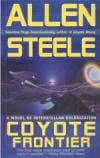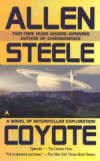 Book three in the Coyote series, this novel takes us once more to the colony planet Coyote. But there’s a new twist. Earth has developed a technology for instantaneous travel between stars, meaning close contact with Earth is possible once more. Coyote seems like paradise to inhabitants of Earth wracked with overcrowding and catastrophic climate change. Will the budding Coyote Federation be able to withstand the onslaught? The original colonists have grown middle aged and responsible, but now their children rebel. It is a classic dichotomy. The old and wise versus the young and energetic. Steele plays to his strength in character creation and development, making this perhaps the most enjoyable of the Coyote books.
Book three in the Coyote series, this novel takes us once more to the colony planet Coyote. But there’s a new twist. Earth has developed a technology for instantaneous travel between stars, meaning close contact with Earth is possible once more. Coyote seems like paradise to inhabitants of Earth wracked with overcrowding and catastrophic climate change. Will the budding Coyote Federation be able to withstand the onslaught? The original colonists have grown middle aged and responsible, but now their children rebel. It is a classic dichotomy. The old and wise versus the young and energetic. Steele plays to his strength in character creation and development, making this perhaps the most enjoyable of the Coyote books.
Unlike the two previous books, this one is not a collection of previously written short stories with interlude pieces. However, Steele has still kept some of that feel. The narrative changes pace, viewpoint and even style between sections. But the episodes are less self contained than before. This effect still takes some getting used to, but it works well.
The epilogue, after the action proper has been concluded and loose ends tied up, is a bit surprising. We are left dangling after a momentous first contact. Said first contact is described in Steele’s novel Spindrift. Blatant plug? Perhaps. But it also reminds us that the story of the colony is still unfolding.









